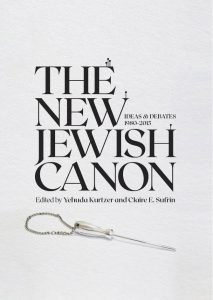Claire E. Sufrin and Yehuda Kurtzer at Marginalia Review:
 We moved forward with the idea of assembling a canon, aware of the chutzpah, based on a few understandings. One is our belief that even when canon formation is not taking place explicitly in a closed gathering, certain ideas and texts become implicitlycanonical through other means such as compelling presentation, citation, and education. Communities and consensuses can create canon by bringing powerful ideas to life and to market, and by privileging some ideas and texts over others. For example, Yosef H. Yerushalmi’s Zakhor is required reading in dozens of college and graduate school courses in Jewish Studies; it is among the most commonly cited texts in Jewish Studies lectures in both academic and lay settings. No one person decided that the book is important, but the book has emerged over time as a canonical piece of Jewish Studies scholarship with relevance for the larger Jewish community. In engaging actively and directly in canon formation, in naming what we were doing an act of “canonization,” and in inviting commentary from our colleagues we hoped to call attention to the implicit canonization that was already happening and to open a conversation about it.
We moved forward with the idea of assembling a canon, aware of the chutzpah, based on a few understandings. One is our belief that even when canon formation is not taking place explicitly in a closed gathering, certain ideas and texts become implicitlycanonical through other means such as compelling presentation, citation, and education. Communities and consensuses can create canon by bringing powerful ideas to life and to market, and by privileging some ideas and texts over others. For example, Yosef H. Yerushalmi’s Zakhor is required reading in dozens of college and graduate school courses in Jewish Studies; it is among the most commonly cited texts in Jewish Studies lectures in both academic and lay settings. No one person decided that the book is important, but the book has emerged over time as a canonical piece of Jewish Studies scholarship with relevance for the larger Jewish community. In engaging actively and directly in canon formation, in naming what we were doing an act of “canonization,” and in inviting commentary from our colleagues we hoped to call attention to the implicit canonization that was already happening and to open a conversation about it.
more here.
